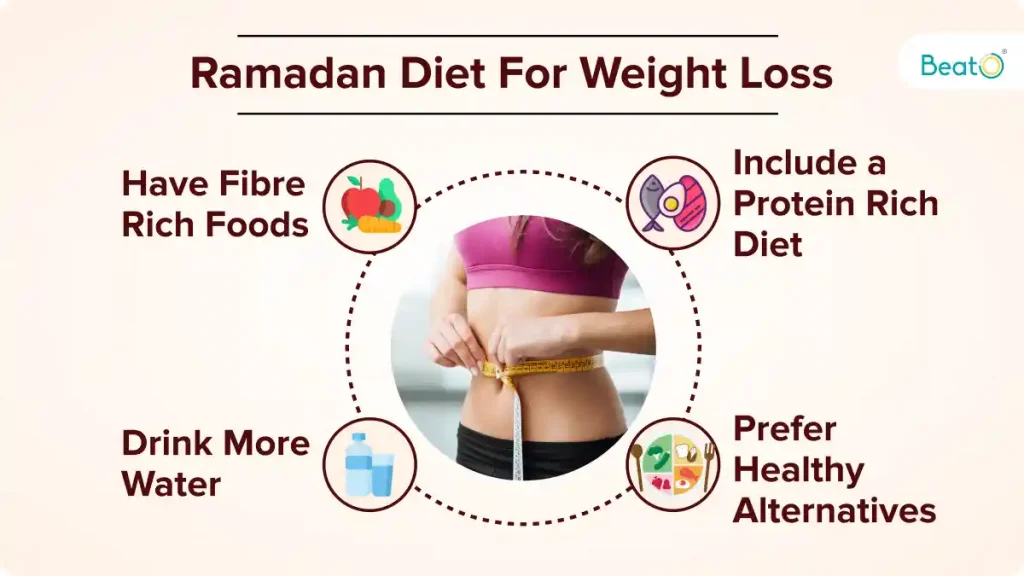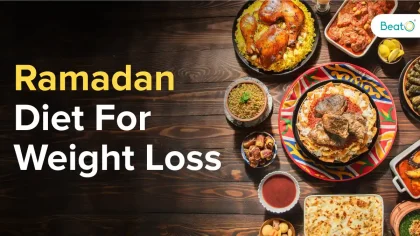Ramadan, the holy month of fasting from dawn to dusk, is a crucial blessed period for Muslims worldwide. This spiritual journey, however, can also serve as an opportunity for physical transformation. Contrary to popular belief, Ramadan can be the perfect time to kickstart your weight loss journey, provided you make mindful choices about what you eat and maintain an active lifestyle.

Weight Loss Tips in Ramadan

Here are a few tips for Ramadan diet for weight loss:
1. Fibre-Rich Foods in Suhoor
Suhoor, the pre-dawn meal before the fast begins, plays a significant role in how you function throughout the day. One way to ensure sustained energy levels and control hunger pangs is by incorporating fibre-rich foods into your suhoor. Foods such as oatmeal, fruits, vegetables, and whole grains are excellent sources of fibre that provide a feeling of fullness and aid in digestion.
Also Read: Bodybuilding Diet In Ramadan: Maximizing Muscle Gains With Right Nutrition
2. Drink Water and Nothing Else!
Every Iftar traditionally includes sugary drinks, juices, and milkshakes, but if you’re trying to lose weight, you have to avoid them. To break your fast, consider having a date and some water. Water consumption speeds up the body’s release of stored fat, lowering the quantity of fat that needs to be broken down by the body to lose weight.
Water increases metabolic rate and reduces appetite. You consequently cut back on your overindulgence in food. Maintaining your fluid intake is a great tip for a Ramadan diet for weight loss. Since water has no calories, drinking sweet juices and sodas instead of water can be a healthy way to lose weight during Ramadan.
3. The Power of Protein
Including protein in your diet is another effective strategy for weight loss during Ramadan. Diets high in protein boost metabolism and suppress appetite, aiding in weight loss. Sources of lean protein like chicken, fish, or plant-based proteins should be a part of your iftar (meal after sunset) or suhoor.
Also Read: Ramadan 2024: Debunking Some Common Myths And Misconceptions Of Ramadan Fasting
4. Increase your Walking Period
They prefer to walk for Fajr prayer because everyone eats healthy food that needs to be digested. Many people simply lie down after Suhoor and do not engage in any physical activity, which can lead to gastrointestinal issues. It is important to go for a walk or choose a Masjid that is at least 20 minutes away from home. This practice should be followed after the evening meal, too.
After breaking fast, one may consume different foods and a break is needed for digestion. Research indicates that light physical activities like walking can help maintain fitness during Ramadan; otherwise, there’s a risk of developing obesity issues.
Also Read: Ramadan Special: Healthy Recipes for Iftar
5. Eat a Balanced Diet to Lose Weight during Ramadan
Your iftar dish needs more than just fruits and vegetables; you also need to include oats, proteins, and extra water. Some examples of Ramadan diet for weight loss include brown rice, salmon, and asparagus.
Your body won’t survive fasting without a healthy diet and exercise regimen, which could leave you feeling weak and lethargic. To lose weight during Ramadan, you must concentrate on a variety of factors, including appropriate exercise, drinking lots of water during Suhoor and Iftar, exercising at the right times, using herbs, getting enough sleep, and so on.
6. Intermittent Fasting and Exercise
While fasting during Ramadan can lead to weight loss, combining it with regular exercise can amplify the results. A study found that fat mass loss was more pronounced with intermittent fasting combined with exercise training. Aim for at least 30 minutes of moderate-intensity workouts like walking, cycling, or yoga before suhoor or after iftar.
7. Making Mindful Choices
Losing weight during Ramadan is not just about what you eat but also about making mindful choices. The focus should be on consuming nutrient-dense foods that keep you satiated for longer periods. Incorporate more fibre-rich foods like vegetables, fruits, and complex carbs into your diet.
Also Read: How to Manage Diabetes During Ramadan?
8. Stay Away from Fat, Sugar, and Salt
Although fried meals like pakoras, samosas, rolls, and other similar items can be quite appealing, they are the worst things to eat during Ramadan diet for weight loss. Processed foods typically contain large amounts of calories, fat, sugar, and salt. Additionally, high in trans fat, fried food contributes to the deposition of visceral fat, particularly in the lower body. During Ramadan, cutting back on salt can also aid in weight loss. Salt causes the body to retain water, which leads to weight gain.
Rich in calories, fried foods and large meals might disrupt your calorie intake and utilisation. As a result, the BMI drops into the obese zone. Eating mindfully advises consuming less of these high-calorie foods.
Final thoughts
Remember, the Ramadan diet for weight loss is not just about physical transformation, but also spiritual growth. The discipline, patience, and mindfulness that come with fasting can also extend to your approach towards food and overall health.
In conclusion, while most people believe that weight loss during Ramadan is a myth, it is possible with the right diet and lifestyle changes. Remember to maintain a balanced diet, stay hydrated, and incorporate some exercise into your daily routine. And most importantly, make sure to enjoy this spiritual journey and the personal growth that comes with it.
Also Read:Diabetes-friendly and Healthy Eid Recipes
Disclaimer: The content of this article is compiled information from generic and public sources. It is in no way a substitute, suggestion, or advice for a qualified medical opinion. Always consult a specialist or your own doctor for more information. Beato App does not claim responsibility for this information.
Are you looking for the perfect glucometer to check your blood sugar level? Try out BeatO smartglucometerkit, affordable and easy to use.
Discover top-tier diabetes care with BeatO’s Chief Clinical Officer,Dr. Navneet Agarwal. His expertise in Diabetes ensures personalised guidance for overall health. Try out a smartglucometerand keep track of blood sugar levels now.




